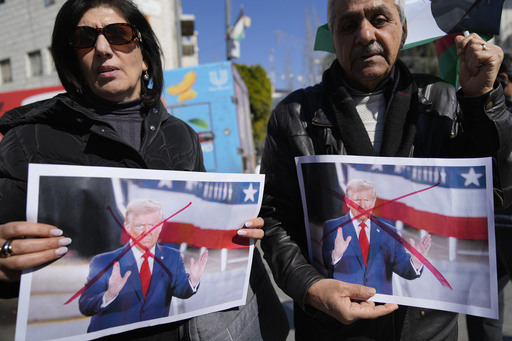
DUBAI, United Arab Emirates — President Donald Trump’s recent proposal suggesting that the United States assume control of the Gaza Strip and permanently move its Palestinian residents faced immediate backlash from various global allies and adversaries on Wednesday.
The idea was presented during a press conference at the White House alongside Israeli Prime Minister Benjamin Netanyahu, who reacted positively as Trump outlined a vision to create new settlements for Palestinians beyond Gaza while developing the region into what he termed “the Riviera of the Middle East.”
Trump stated, “The U.S. will take over the Gaza Strip, and we will do a job with it too. We’ll own it and be responsible for dismantling all of the dangerous unexploded bombs and other weapons on the site, level the site, and get rid of the destroyed buildings, level it out, create an economic development that will supply unlimited numbers of jobs.”
These comments emerged amidst a delicate ceasefire between Israel and Hamas, as hostages were being exchanged for prisoners held by Israel. Countries like Egypt, Jordan, and other regional allies quickly voiced their rejection of relocating over 2 million Palestinians, with Egypt’s Foreign Ministry emphasizing the importance of rebuilding Gaza without forcibly displacing its residents.
Saudi Arabia, a key ally of the U.S., responded firmly to Trump’s expansive suggestion about Gaza’s takeover, reiterating its long-standing commitment to supporting an independent Palestinian state. The Saudi statement condemned any attempts to undermine the rights of the Palestinian people through settlement policies or displacement.
In a similar vein, Australian Prime Minister Anthony Albanese affirmed his country’s unwavering support for a two-state solution in the Middle East, maintaining that Australia’s position has consistently remained unchanged over the years.
Trump’s proposal added strain to his relations with allies, already frayed by past controversial suggestions including purchasing Greenland and annexing Canadian territories. It remained uncertain whether his Gaza takeover proposal was a strategic move or simply a negotiating tactic.
Albanese appeared exasperated when questioned about the Gaza plan, emphasizing consistency in Australia’s foreign policy, saying, “My job is to support Australia’s position.” New Zealand’s government conveyed its long-established backing for a two-state resolution and refrained from commenting on every new proposal.
China also took a stance on the issue, with its Foreign Ministry spokesperson advocating for a two-state resolution while opposing any forced relocations from Gaza. Turkish Foreign Minister Hakan Fidan condemned Trump’s deportation idea, labeling it as unacceptable and nonsensical.
Palestinian President Mahmoud Abbas called for United Nations intervention to safeguard the rights of the Palestinian people, calling Trump’s plans a grave violation of international law. In contrast, Hamas criticized the proposal, framing it as a catalyst for chaos in the region while arguing that it rewarded Israeli aggression against Palestinians.
The ongoing conflict erupted following Hamas’s attack on Israel on October 7, 2023, resulting in significant casualties, including around 1,200 deaths and 250 hostages taken by Hamas. The retaliatory actions by Israel have reportedly led to the deaths of over 47,000 Palestinians, including a substantial number of women and children, and have displaced approximately 90% of Gaza’s 2.3 million residents.
In the United States, opposition to Trump’s plan was swift, with Democratic Senator Chris Coons calling the remarks “offensive and insane and dangerous and foolish.” He criticized the proposal’s potential to portray the U.S. as an untrustworthy partner on the global stage, questioning the reasoning behind abandoning established humanitarian efforts.
Democratic Representative Rashida Tlaib, a Palestinian American from Michigan, accused Trump in a social media post of advocating for what she termed “ethnic cleansing” through the potential resettlement of Gaza’s entire population.
As reactions unfold globally, the implications of Trump’s proposal continue to stir controversy and highlight the complexities surrounding the Israeli-Palestinian conflict.

